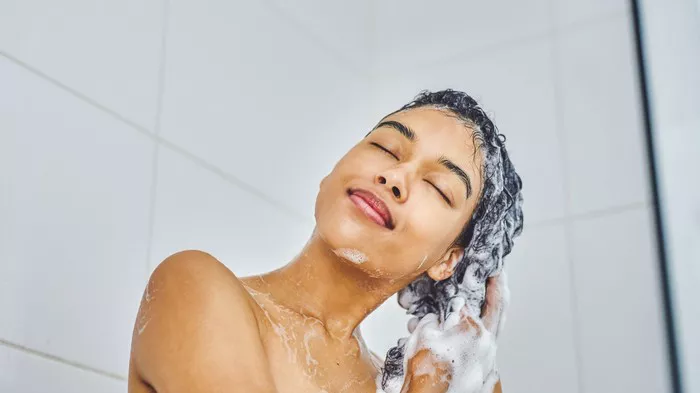Swimming is an excellent form of exercise and relaxation, offering numerous health benefits. However, the chlorine, saltwater, and other chemicals present in swimming pools and natural bodies of water can wreak havoc on your hair if not properly cared for. Many individuals wonder what happens if they neglect to wash their hair after swimming. In this article, we will delve into the potential consequences of failing to cleanse your hair post-swim and provide practical tips for maintaining healthy locks.
Understanding the Impact of Chlorine and Saltwater on Hair
Chlorine is commonly used to sanitize swimming pools, effectively killing bacteria and preventing the spread of waterborne illnesses. While chlorine serves a vital purpose in maintaining pool hygiene, it can strip the natural oils from your hair, leaving it dry, brittle, and prone to breakage. Additionally, chlorine exposure may cause hair color to fade, particularly in individuals with dyed or highlighted hair.
On the other hand, saltwater, prevalent in oceans and seas, contains high concentrations of salt and minerals. While saltwater can offer some benefits for the skin, prolonged exposure may lead to dehydration of the hair shaft, resulting in frizziness and lackluster locks. Furthermore, the abrasive nature of salt can roughen the hair cuticle, making it more susceptible to damage.
The Importance of Washing Your Hair After Swimming
Failure to wash your hair after swimming can lead to a variety of issues, ranging from cosmetic concerns to potential damage to the hair structure. Here are some of the consequences you may encounter:
1. Buildup of Chemical Residues: Chlorine and saltwater can leave behind residue on your hair, causing it to feel sticky, heavy, and unclean. Over time, this buildup can accumulate, making your hair appear dull and lifeless.
2. Dryness and Brittle Hair: Exposure to chlorine and saltwater can strip away the natural oils that keep your hair hydrated and supple. Without proper cleansing, your hair may become excessively dry, brittle, and prone to breakage.
3. Scalp Irritation: Chlorine and saltwater can also irritate the scalp, leading to itchiness, redness, and flakiness. Failure to wash away these irritants may exacerbate existing scalp conditions, such as dandruff or eczema.
4. Fading Hair Color: If you have color-treated hair, prolonged exposure to chlorine or saltwater without washing can cause your hair color to fade prematurely. This is particularly problematic for individuals who invest time and money in maintaining vibrant hair hues.
5. Damage to Hair Structure: The harsh chemicals present in swimming pools and saltwater can compromise the structural integrity of your hair, making it more susceptible to split ends, frizz, and overall damage. Without proper care, your hair may become weak and prone to breakage.
Practical Tips for Post-Swim Hair Care
To mitigate the negative effects of swimming on your hair, it’s essential to adopt a diligent post-swim hair care routine. Here are some practical tips to help you maintain healthy hair after swimming:
1. Rinse Immediately: After swimming, rinse your hair thoroughly with fresh water to remove chlorine, salt, and other chemicals. Focus on thoroughly saturating your hair to ensure all residues are washed away.
2. Use a Clarifying Shampoo: Incorporate a clarifying shampoo into your hair care routine to remove buildup and impurities from your hair and scalp. Look for formulas specifically designed to neutralize chlorine and saltwater residues.
3. Condition Regularly: Restore moisture to your hair by using a hydrating conditioner after washing. Opt for a conditioner that replenishes lost oils and provides nourishment to dry, damaged hair.
4. Deep Condition Weekly: Treat your hair to a deep conditioning treatment at least once a week to repair damage and improve overall hair health. Choose a conditioning mask or treatment that targets your specific hair concerns, such as hydration or repair.
5. Protect Your Hair: Before swimming, apply a leave-in conditioner or oil to create a protective barrier between your hair and the water. Additionally, consider wearing a swim cap to minimize chlorine exposure and preserve your hair color.
6. Avoid Heat Styling: Limit the use of heat styling tools, such as blow dryers, flat irons, and curling wands, as they can further dry out and damage your hair. Instead, embrace air drying or use heat protectant products before styling.
7. Trim Regularly: Schedule regular trims to remove split ends and prevent further damage to your hair. A professional trim every 6-8 weeks can help maintain the health and appearance of your hair.
Conclusion
In conclusion, neglecting to wash your hair after swimming can have detrimental effects on its health and appearance. The chlorine, saltwater, and other chemicals present in swimming pools and natural bodies of water can strip away moisture, cause dryness and brittleness, and lead to scalp irritation and hair damage. By adopting a thorough post-swim hair care routine and following practical tips for maintenance, you can mitigate these effects and keep your hair looking and feeling its best. Remember to rinse immediately after swimming, use clarifying shampoos and hydrating conditioners, and protect your hair from further damage. With proper care and attention, you can enjoy the benefits of swimming without compromising the health of your hair.


